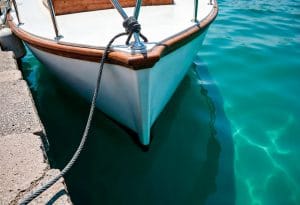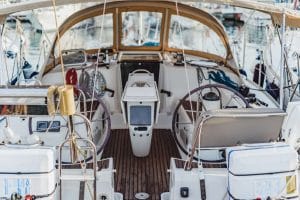As in any land vehicle, on a ship it is mandatory to carry certain regulatory documentation, which may be required at any time by the competent authority and whose Failure to do so can result in sanctions and heavy fines. economic.
Don't know what documentation you should always carry on the boat? Keep on reading to know everything.
What documents do you have to carry on board the boat?
Whenever you go sailing, check that you have the following valid documentation with you and that it registration and name of the vessel are legible in all documents:
- Spanish Registration Certificate: proves that the vessel is registered in the Vessel Registration Registry.
- Navigation Permit: All flagged vessels, even those without crew, must have this permit in force.
- Registration Certificate: proves that the boat is registered in the special regime for pleasure boats with “CE” marking of a length equal to or less than 12 meters
- Certificate of Navigability: similar to the ITV of cars, this certificate certifies that the boat has passed the ITB (Technical Inspection of Vessels) in an entity accredited by Royal Decree 1434/1999. It must ALWAYS be in force at the time of navigation.
- Official skipper title: according to type of boat Yet the navigation area, to be valid it must be in force at the time it is required.
- Liability insurance: accredited by proof of premium payment. It is mandatory for all motor boats and those that, although they do not have it, have a length greater than 6 meters.
- Declaration of Conformity and Owner's Manual of the boat and engine: only in the case of boats with a CE Marked hull plate according to Royal Decree 2127/2004.
- flagging: permission to plant trees in the national flag.
- Tuition: alphanumeric set that unequivocally identifies the vessel and that, in addition, contains a multitude of information about it:
- List from 1 to 9, that is, the activity to which the boat is dedicated.
- Maritime Province in which the boat is registered.
- Maritime District of the port to which the registration belongs.
- Ship's folio.
- Year of the vessel (after 1991, when this figure began to be included in registrations).
- Record: although the registration already refers to it, the registry confirms that the pleasure boat is registered in the Seventh List, corresponding to pleasure boats, dedicated to sports or non-professional fishing, always without profit motive.
- Personal documentation of the crew members: All passengers on board must carry their ID or official personal identification with them at all times.
Are you interested in: Why are ships registered under the Polish flag?
How to get documentation for a boat?
The official documentation of the vessel depends on the General Directorate of the Merchant Navy, through the General Registry of Ships, Maritime Captaincies or corresponding Maritime Districts.

Which boats do not need documentation?
Although the boats with reduced length (less than 2.5 meters) and without motor They do not require registration, it is always advisable to have, at least, liability insurance that covers possible unforeseen events.
Are you interested in: Navigation Permit or License: everything you need to know
What boats need registration?
According to Spanish legislation, it is mandatory to register every boat with a length greater than 2.5 meters and that it is not considered a “beach artifact.” Depending on the use that is going to be given to it, the boat can be registered on one of the following lists:
- Sixth List: vessels intended for commercial exploitation. They are those intended for rental with or without skipper or for training in navigation schools.
- Seventh List: non-profit recreational, leisure or sport fishing boats.
Do you need insurance to be able to navigate?
Like cars, all boats must have a third party civil liability insurance, which must be justified by presenting proof of payment of the last premium and the contract policy if required by the competent maritime authority.
It is important to note that recreational boats of length less than 6 meters that do not have motor propulsion.
In any other case, the insurance must cover, at a minimum, the material damage, injury or death to third parties; all economic losses arising from the above and any damage caused to other vessels, whether there has been contact or not.




